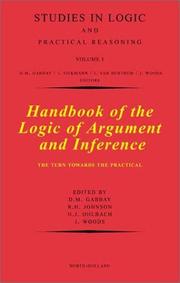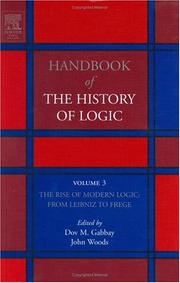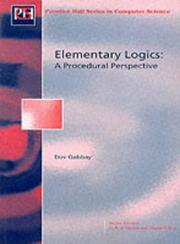| Listing 1 - 10 of 34 | << page >> |
Sort by
|
Book
ISSN: 16112482 ISBN: 3642413889 3642413897 Year: 2013 Publisher: Heidelberg [Germany] : Springer,
Abstract | Keywords | Export | Availability | Bookmark
 Loading...
Loading...Choose an application
- Reference Manager
- EndNote
- RefWorks (Direct export to RefWorks)
This text offers an extension to the traditional Kripke semantics for non-classical logics by adding the notion of reactivity. Reactive Kripke models change their accessibility relation as we progress in the evaluation process of formulas in the model. This feature makes the reactive Kripke semantics strictly stronger and more applicable than the traditional one. Here we investigate the properties and axiomatisations of this new and most effective semantics, and we offer a wide landscape of applications of the idea of reactivity. Applied topics include reactive automata, reactive grammars, reactive products, reactive deontic logic and reactive preferential structures. Reactive Kripke semantics is the next step in the evolution of possible world semantics for non-classical logics, and this book, written by one of the leading authorities in the field, is essential reading for graduate students and researchers in applied logic, and it offers many research opportunities for PhD students.
Mathematics --- Physical Sciences & Mathematics --- Mathematical Theory --- Artificial intelligence. --- Computer science. --- Logic, Symbolic and mathematical. --- Logic. --- Argumentation --- Deduction (Logic) --- Deductive logic --- Dialectic (Logic) --- Logic, Deductive --- Algebra of logic --- Logic, Universal --- Mathematical logic --- Symbolic and mathematical logic --- Symbolic logic --- Informatics --- AI (Artificial intelligence) --- Artificial thinking --- Electronic brains --- Intellectronics --- Intelligence, Artificial --- Intelligent machines --- Machine intelligence --- Thinking, Artificial --- Mathematical logic. --- Computer Science. --- Mathematical Logic and Formal Languages. --- Artificial Intelligence (incl. Robotics). --- Mathematical Logic and Foundations. --- Algebra, Abstract --- Metamathematics --- Set theory --- Syllogism --- Intellect --- Philosophy --- Psychology --- Science --- Reasoning --- Thought and thinking --- Bionics --- Cognitive science --- Digital computer simulation --- Electronic data processing --- Logic machines --- Machine theory --- Self-organizing systems --- Simulation methods --- Fifth generation computers --- Neural computers --- Methodology --- Artificial Intelligence.
Book
ISBN: 904819587X 9786612995682 1282995685 9048195888 Year: 2010 Publisher: Dordrecht : Springer,
Abstract | Keywords | Export | Availability | Bookmark
 Loading...
Loading...Choose an application
- Reference Manager
- EndNote
- RefWorks (Direct export to RefWorks)
Legal theory, political sciences, sociology, philosophy, logic, artificial intelligence: there are many approaches to legal argumentation. Each of them provides specific insights into highly complex phenomena. Different disciplines, but also different traditions in disciplines (e.g. analytical and continental traditions in philosophy) find here a rare occasion to meet. The present book contains contributions, both historical and thematic, from leading researchers in several of the most important approaches to legal rationality. One of the main issues is the relation between logic and law: the way logic is actually used in law, but also the way logic can make law explicit. An outstanding group of philosophers, logicians and jurists try to meet this issue. The book is more than a collection of papers. However different their respective conceptual tools may be, the authors share a common conception: legal argumentation is a specific argumentation context.
Argumentation. --- Language and logic -- Congresses. --- Law -- Methodology -- Congresses. --- Logic -- Congresses. --- Law --- Philosophy & Religion --- Law, Politics & Government --- Law, General & Comparative --- Philosophy --- Methodology --- Sociological jurisprudence. --- Rationalism. --- Philosophy. --- Law. --- Political science. --- Logic. --- Artificial intelligence. --- Theories of Law, Philosophy of Law, Legal History. --- History of Philosophy. --- Political Science. --- Artificial Intelligence (incl. Robotics). --- Jurisprudence --- Knowledge, Theory of --- Religion --- Belief and doubt --- Deism --- Free thought --- Realism --- Law and society --- Society and law --- Sociology of law --- Sociology --- Law and the social sciences --- Philosophy (General). --- Artificial Intelligence. --- AI (Artificial intelligence) --- Artificial thinking --- Electronic brains --- Intellectronics --- Intelligence, Artificial --- Intelligent machines --- Machine intelligence --- Thinking, Artificial --- Bionics --- Cognitive science --- Digital computer simulation --- Electronic data processing --- Logic machines --- Machine theory --- Self-organizing systems --- Simulation methods --- Fifth generation computers --- Neural computers --- Administration --- Civil government --- Commonwealth, The --- Government --- Political theory --- Political thought --- Politics --- Science, Political --- Social sciences --- State, The --- Argumentation --- Deduction (Logic) --- Deductive logic --- Dialectic (Logic) --- Logic, Deductive --- Intellect --- Psychology --- Science --- Reasoning --- Thought and thinking --- Law—Philosophy. --- Mental philosophy --- Humanities --- Acts, Legislative --- Enactments, Legislative --- Laws (Statutes) --- Legislative acts --- Legislative enactments --- Legislation --- History. --- Legal history --- History and criticism

ISBN: 128178141X 9786611781415 0080532918 0444506500 Year: 2002 Publisher: Amsterdam ; Boston : North Holland/Elsevier,
Abstract | Keywords | Export | Availability | Bookmark
 Loading...
Loading...Choose an application
- Reference Manager
- EndNote
- RefWorks (Direct export to RefWorks)
The Handbook of the Logic of Argument and Inference is an authoritative reference work in a single volume, designed for the attention of senior undergraduates, graduate students and researchers in all the leading research areas concerned with the logic of practical argument and inference. After an introductory chapter, the role of standard logics is surveyed in two chapters. These chapters can serve as a mini-course for interested readers, in deductive and inductive logic, or as a refresher. Then follow two chapters of criticism; one the internal critique and the other the emp
Logic, Symbolic and mathematical. --- Mathematics. --- Math --- Science --- Algebra of logic --- Logic, Universal --- Mathematical logic --- Symbolic and mathematical logic --- Symbolic logic --- Mathematics --- Algebra, Abstract --- Metamathematics --- Set theory --- Syllogism

ISBN: 9780444516114 0444516115 9786611057992 1281057991 008053287X 9780444516206 0444516204 9780444516237 0444504664 9780444516220 9780444516251 9780444504661 9780444516107 0444516255 0444516107 9780444515964 0444516220 0444516239 0444515968 9780444516213 9780444529374 1280630930 9781280630934 0080463037 9780080463032 9780080885476 0080885470 1281144932 9781281144935 0444516212 9780444529367 0444529365 0444529373 9780080931692 0080931693 1283134039 9781283134033 9786613134035 9786611144937 0080557015 9786610630936 9780080931708 9780080532875 1282168207 9786612168208 9780444516244 0444516247 Year: 2004 Publisher: Amsterdam: Elsevier,
Abstract | Keywords | Export | Availability | Bookmark
 Loading...
Loading...Choose an application
- Reference Manager
- EndNote
- RefWorks (Direct export to RefWorks)
This volume is number ten in the 11-volume Handbook of the History of Logic. While there are many examples were a science split from philosophy and became autonomous (such as physics with Newton and biology with Darwin), and while there are, perhaps, topics that are of exclusively philosophical interest, inductive logic - as this handbook attests - is a research field where philosophers and scientists fruitfully and constructively interact. This handbook covers the rich history of scientific turning points in Inductive Logic, including probability theory and decision theory. Written by lead
Logic --- Philosophy. --- Mental philosophy --- Humanities --- History. --- Logic - History. --- Logique --- Histoire --- Induction (Logic) --- Philosophy --- History --- Inductive logic --- Logic, Inductive --- Reasoning --- Argumentation --- Deduction (Logic) --- Deductive logic --- Dialectic (Logic) --- Logic, Deductive --- Intellect --- Psychology --- Science --- Thought and thinking --- Methodology

ISBN: 9780444506504 0444506500 9780080532912 0080532918 9786611781415 6611781412 128178141X Year: 2002 Publisher: Boston North Holland/Elsevier
Abstract | Keywords | Export | Availability | Bookmark
 Loading...
Loading...Choose an application
- Reference Manager
- EndNote
- RefWorks (Direct export to RefWorks)
The Handbook of the Logic of Argument and Inference is an authoritative reference work in a single volume, designed for the attention of senior undergraduates, graduate students and researchers in all the leading research areas concerned with the logic of practical argument and inference. After an introductory chapter, the role of standard logics is surveyed in two chapters. These chapters can serve as a mini-course for interested readers, in deductive and inductive logic, or as a refresher. Then follow two chapters of criticism; one the internal critique and the other the emp
Mathematical logic --- Logic, Symbolic and mathematical --- Logic, Symbolic and mathematical. --- Mathematics.

ISBN: 0137263651 Year: 1998 Publisher: New York : Prentice Hall Europe,
Abstract | Keywords | Export | Availability | Bookmark
 Loading...
Loading...Choose an application
- Reference Manager
- EndNote
- RefWorks (Direct export to RefWorks)
Book
ISBN: 9027716056 9027715424 9027716048 9027716064 9401088012 9400952031 9401070210 9400911718 9400962614 9400962592 9400970684 9400970668 9789027715425 9789027716040 9789027716057 9789027716064 Year: 1983 Volume: 164,165,166, 167 Publisher: Dordrecht: Reidel,
Abstract | Keywords | Export | Availability | Bookmark
 Loading...
Loading...Choose an application
- Reference Manager
- EndNote
- RefWorks (Direct export to RefWorks)
Mathematical logic --- Logique. --- Philosophie du langage. --- Langage et logique. --- Language and languages --- Language and logic. --- Linguistics and logic --- Logic in language --- Logic --- Semantics --- Philosophy --- #GROL:SEMI-160<03> Hand 2 --- 161.1 --- 161.1 Begrip. Begripsvormen. Exactheid van begrippen --- Begrip. Begripsvormen. Exactheid van begrippen --- Argumentation --- Deduction (Logic) --- Deductive logic --- Dialectic (Logic) --- Logic, Deductive --- Intellect --- Psychology --- Science --- Reasoning --- Thought and thinking --- Methodology --- Logique --- --mélanges --- --Logique --- --Logic --- --Language and logic --- Logic. --- Philosophie --- Philosophy of language --- Logique symbolique. (Mélanges) --- Logica (Symbolische). (Versch. onderwerpen) --- #GROL:SEMI-160<03> Hand 1 --- 160.1 --- 160.1 Wezen en doel van de logica. Filosofie van de logica --- Wezen en doel van de logica. Filosofie van de logica --- #GROL:SEMI-160<03> Hand 3 --- Language and logic --- Language and languages - Philosophy
Book
ISBN: 1402063237 9786611044855 1281044857 1402063245 Year: 2007 Publisher: Dordrecht : Springer,
Abstract | Keywords | Export | Availability | Bookmark
 Loading...
Loading...Choose an application
- Reference Manager
- EndNote
- RefWorks (Direct export to RefWorks)
theywereextensivelydiscussedbyallauthorsina3-dayHandbookmeeting. These are: • a chapter on non-monotonic logic • a chapter on combinatory logic and ?-calculus We felt at the time (1979) that non-monotonic logic was not ready for a chapter yet and that combinatory logic and ?-calculus was too far re- 1 moved. Non-monotonic logic is now a very major area of philosop- cal logic, alongside default logics, labelled deductive systems, ?bring l- ics, multi-dimensional, multimodal and substructural logics. Intensive - examinations of fragments of classical logic have produced fresh insights, including at time decision procedures and equivalence with non-classical systems. Perhaps the most impressive achievement of philosophical logic as arising inthepastdecadehasbeenthee?ectivenegotiationofresearchpartnerships with fallacy theory, informal logic and argumentation theory, attested to by the Amsterdam Conference in Logic and Argumentation in 1995, and the two Bonn Conferences in Practical Reasoning in 1996 and 1997. These subjects are becoming more and more useful in agent theory and intelligent and reactive databases. Finally, ?fteen years after the start of the Handbook project, I would like to take this opportunity to put forward my current views about logic in computer science, computational linguistics and arti?cial intelligence. In the early 1980s the perception of the role of logic in computer science was that of a speci?cation and reasoning tool and that of a basis for possibly neat computer languages. The computer scientist was manipulating data structures and the use of logic was one of his options.
Artificial intelligence. --- Linguistics. --- Logic. --- Philosophy. --- Philosophy --- Philosophy & Religion --- Logic --- Argumentation --- Deduction (Logic) --- Deductive logic --- Dialectic (Logic) --- Logic, Deductive --- Mathematics. --- Language and languages --- Philosophy and science. --- Computer logic. --- Mathematical logic. --- Mathematics, general. --- Philosophy of Language. --- Philosophy of Science. --- Logics and Meanings of Programs. --- Mathematical Logic and Formal Languages. --- Intellect --- Psychology --- Science --- Reasoning --- Thought and thinking --- Methodology
Book
ISBN: 940070478X 9786613086136 9400704798 1283086131 9789400704787 Year: 2011 Publisher: Berlin: Springer,
Abstract | Keywords | Export | Availability | Bookmark
 Loading...
Loading...Choose an application
- Reference Manager
- EndNote
- RefWorks (Direct export to RefWorks)
Belief Revision Refutation and systems in Propositional Logic. A Quantifier Scope in Formal Linguistics and Non-deterministic Semantics for Logical Systems.
Logic. --- Philosophy --- Philosophy & Religion --- Logic --- Argumentation --- Deduction (Logic) --- Deductive logic --- Dialectic (Logic) --- Logic, Deductive --- Philosophy. --- Linguistics. --- Linguistics, general. --- Philosophy, general. --- Intellect --- Psychology --- Science --- Reasoning --- Thought and thinking --- Methodology --- Philosophy (General). --- Mental philosophy --- Humanities --- Linguistic science --- Science of language --- Language and languages
Book
ISBN: 3642261876 3642044069 9786612836084 3642044077 1282836080 Year: 2010 Publisher: Berlin : Springer,
Abstract | Keywords | Export | Availability | Bookmark
 Loading...
Loading...Choose an application
- Reference Manager
- EndNote
- RefWorks (Direct export to RefWorks)
Agents act on the basis of their beliefs and these beliefs change as they interact with other agents. In this book the authors propose and explain general logical tools for handling change. These tools include preferential reasoning, theory revision, and reasoning in inheritance systems, and the authors use these tools to examine nonmonotonic logic, deontic logic, counterfactuals, modal logic, intuitionistic logic, and temporal logic. This book will be of benefit to researchers engaged with artificial intelligence, and in particular agents, multiagent systems and nonmonotonic logic.
Intelligent agents (Computer software). --- Logic, Symbolic and mathematical. --- Nonmonotonic reasoning. --- Programming languages (Electronic computers). --- Mechanical Engineering --- Engineering & Applied Sciences --- Computer Science --- Mechanical Engineering - General --- Information Technology --- Artificial Intelligence --- Intelligent agents (Computer software) --- Algebra of logic --- Logic, Universal --- Mathematical logic --- Symbolic and mathematical logic --- Symbolic logic --- Non-monotonic reasoning --- Agents, Autonomous (Computer software) --- Agents, Cognitive (Computer software) --- Agents, Intelligent (Computer software) --- Assistants, Cognitive (Computer software) --- Assistants, Intelligent software --- Autonomous agents (Computer software) --- Cognitive agents (Computer software) --- Cognitive assistants (Computer software) --- IAs (Computer software) --- Intelligent agent software --- Intelligent software agents --- Intelligent software assistants --- Software agents (Computer software) --- Special agents (Computer software) --- Computer science. --- Logic. --- Computers. --- Mathematical logic. --- Artificial intelligence. --- Mathematics. --- Computer Science. --- Artificial Intelligence (incl. Robotics). --- Mathematics, general. --- Theory of Computation. --- Mathematical Logic and Formal Languages. --- Mathematical Logic and Foundations. --- Artificial intelligence --- Mathematics --- Algebra, Abstract --- Metamathematics --- Set theory --- Syllogism --- Reasoning --- Computer programs --- Information theory. --- Artificial Intelligence. --- Argumentation --- Deduction (Logic) --- Deductive logic --- Dialectic (Logic) --- Logic, Deductive --- Intellect --- Philosophy --- Psychology --- Science --- Thought and thinking --- Informatics --- Communication theory --- Communication --- Cybernetics --- Math --- AI (Artificial intelligence) --- Artificial thinking --- Electronic brains --- Intellectronics --- Intelligence, Artificial --- Intelligent machines --- Machine intelligence --- Thinking, Artificial --- Bionics --- Cognitive science --- Digital computer simulation --- Electronic data processing --- Logic machines --- Machine theory --- Self-organizing systems --- Simulation methods --- Fifth generation computers --- Neural computers --- Methodology --- Automatic computers --- Automatic data processors --- Computer hardware --- Computing machines (Computers) --- Electronic calculating-machines --- Electronic computers --- Hardware, Computer --- Computer systems --- Calculators --- Cyberspace
| Listing 1 - 10 of 34 | << page >> |
Sort by
|

 Search
Search Feedback
Feedback About UniCat
About UniCat  Help
Help News
News